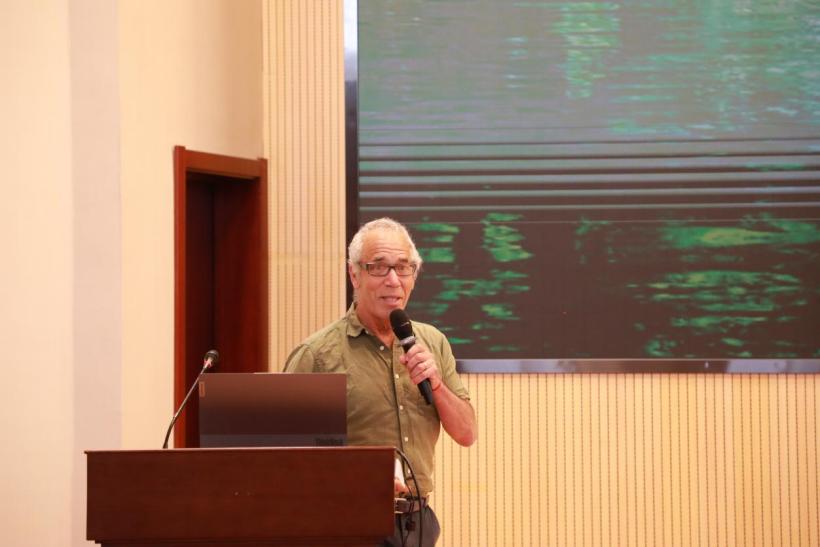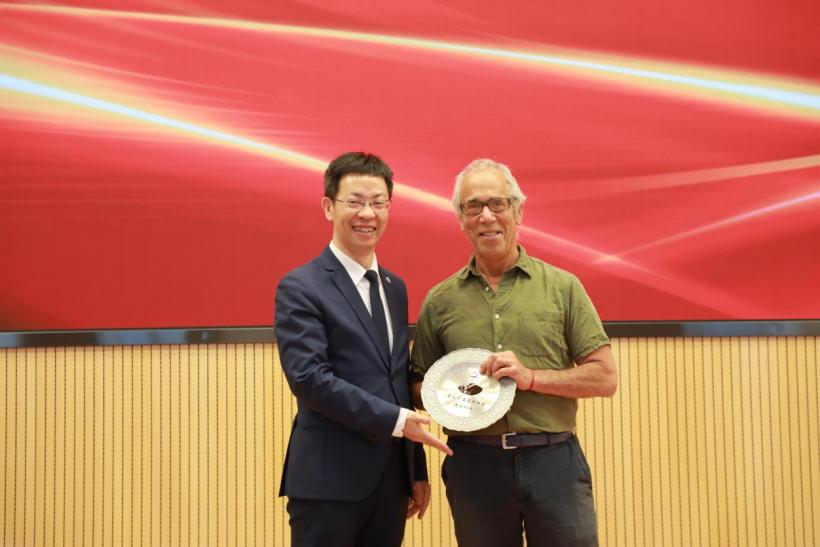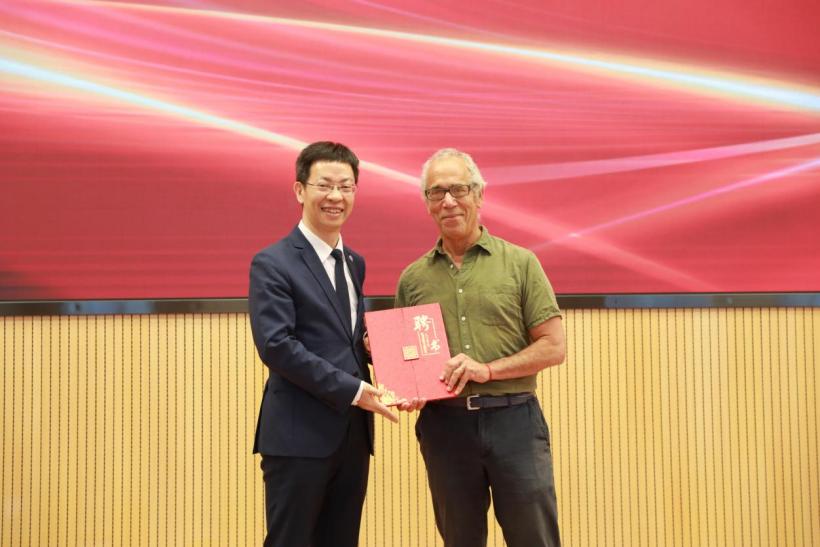On the morning of June 16, the fourth lecture of the Song Zexing Overseas Lecture Series was held in the Academic Lecture Hall of the Puhe Campus administration building. Professor Russell Cooper, from the European University Institute, was invited to give a lecture entitled “The Economics of AI: The Influence of Sophisticated Traders.” Professor Cooper is a researcher at the National Bureau of Economic Research and a member of the International Econometrics Society. Professor Yu Miaojie, a deputy to the 14th National People’s Congress, a member of the standing committee of the 14th Liaoning Provincial People’s Congress, deputy secretary of the CPC Committee, and president of Liaoning University, attended the report and delivered a welcome speech. Professor Yan Ping, from the China Economic Research Institute of LNU, presided over the meeting.

In this internationally renowned lecture hall, Professor Cooper primarily discussed the interaction between artificial intelligence (AI) and the economy, with dynamic stability, strategic interactions, banking fragility, and household finance being among its applicative scenarios. Professor Cooper’s article considers AI to be a “precision trader” and investigates the interactions between AI and ordinary people in the economy. AI, Professor Cooper emphasizes, is not a cold code or a dazzling search engine; it is rather a tool to assist people in solving problems. “Why are people afraid of AI?” he asks. “Are we concerned about job losses caused by machines replacing humans, conflict between AI and humans, or macroeconomic instability caused by AI?” Despite the aforementioned negative consequences, Professor Cooper stresses that the timely dividends that AI may bring include: creating new jobs, becoming a precision trader that is “smarter” than ordinary persons, and gaining more decision-making tools.
Professor Cooper first proposes a traditional macro-generational overlapping model with nominal currency, with two types of decision makers: AI and ordinary people. Their differences in current choices are attributed to their respective differing expectations for the future. Each generation in the model will live in two phases: youth and old age. When you are young, you work and convert your labor income into nominal currency; when you are old, you use your money to buy consumer goods. The central issue here is that young people's purchasing decisions are influenced by their expectations of future commodity prices: AI is forward-looking, whereas ordinary people are backward-looking. The theoretical model’s results show that AI's decisions will cause instability in the economy’s output and price level, with the equilibrium value of output continuing to evolve overtime in the direction of reduction. Additionally, as AI becomes more prevalent in the economy, this dynamic instability will become more apparent.
To back his claims, Professor Cooper cited research from renown enterprise-dynamics scholars Haltiwanger and Waldman, as well as the research of the famous industrial-organization scholar Hendrycks, which re-examine the strategic interactions between AI and ordinary people in the economy from the perspective of micro-game theory. Professor Cooper states that if the behaviors of these two types of decision makers are substitutes for each other, AI will lead the market; however, if the actions of these two types of decision makers are complementary, ordinary people will lead the market. Ordinary people's ability to gather information in the financial market is far inferior to that of AI, so they will be squeezed out of the market. However, a financial market based solely on AI is disastrous, and this “natural selection” based on information-gathering ability is fraught with speculation and instability.
Professor Cooper then moved on to discuss the banking system’s fragility. He began by reviewing the classic Diamond-Dybvig model, in which the bank run was caused by a lack of coordination among depositors. Although the banking system provides depositors with a higher return on funds by pooling individual funds, it also provides depositors with convenient liquidity via the reserve system; however, the mismatch between banks’ short-term liabilities and the maturity of long-term assets is likely to become a source of bank liquidity exhaustion. If depositor confidence deteriorates, a bank run will occur, causing the banking system to shift from “good equilibrium” to “bad equilibrium”. Consequently, as a policy remedy, the deposit insurance system was created. Professor Cooper then introduced artificial intelligence (AI) into this system. “Will AI hasten the spread of people’s fear about the depletion of bank funds?” he asks. “Or can humans ‘train’ AI to always keep its promise not to run banks?” Cooper asserts that the latter, without a doubt, adds more imagination to policymakers’ toolbox.
Professor Cooper also examined the role of AI in the case of financial market friction in the field of family finance, which he has studied extensively in recent years. This context contrasts the differences in family financial situations between China and the United States. Americans showed 15-40% more financial market participation than Chinese people, regardless of whether they had a higher education or not. When the financial assets structure of families in the two countries is compared, the proportion of current assets in total assets of American families is significantly higher than that of Chinese families, while less liquid real estate is the main asset of Chinese families. Adjusting the family asset structure necessitates adjustment costs in this theoretical model. The adjustment cost will be reduced if AI is more efficient and faster than the human brain in solving complex asset allocation problems. As a result, with the assistance of AI, ordinary people’s participation in the financial market will increase, resulting in a revaluation of financial asset prices and a reshaping of the pattern of household asset inequality.
Professor Cooper ended his lecture with a cordial exchange and interaction with teachers and students on the spot during the report meeting, providing meticulous and patient responses to the questions raised by the participating teachers.


Afterwards, Professor Yu Miaojie presented Professor Cooper with the commemorative plate of the Song Zexing Overseas Famous Lecture Hall and the Letter of Appointment of Lifelong Honorary Professor of Liaoning University. Wang Dandan, the Department of Economics’ teacher representative, wore the school emblem and presented Professor Cooper with flowers.

This report was hosted by the Economics Department of Liaoning University and undertaken by the China Economic Research Institute of Liaoning University and the International Exchange Office of Liaoning University. The main officers in charge of the unit affiliated to the Department of Economics, and more than 300 representatives of faculty members and students attended the meeting.
Introduction to Prof. Russell Wade Cooper:
Russell Wade Cooper is a professor at the European University Institute (EUI), a researcher of the National Bureau of Economic Research (NBER), and a fellow of the Econometric Society. In 1982, Prof. Cooper received his Ph.D. in Economics from the University of Pennsylvania, and he later taught at Yale University, the University of Iowa, Boston University, the University of Texas (being head of the economics department), Pennsylvania State University, and other institutions. He has made significant contributions to economics, with his papers and works being widely cited. Prof. Cooper has published more than 100 heavyweight papers in macroeconomics, international economics, industrial organization, experimental economics, labor economics, and monetary economics, including 19 academic papers being published in the top journal of economics (TOP 5).
Prof. Cooper’s original theories about the coordination game have become an important theoretical cornerstone in macroeconomics for understanding friction and incomplete information. His recent research has focused on fiscal policy, dynamic factor demand, and family finance in monetary union. His research results have been published in Review of Economic Studies, Economic Journal, RAND Journal of Economics, Journal of Monetary Economics, International Economic Review, The American Economic Journal: Macro, Review of Economic Dynamics, European Economic Review, and other top international journals.